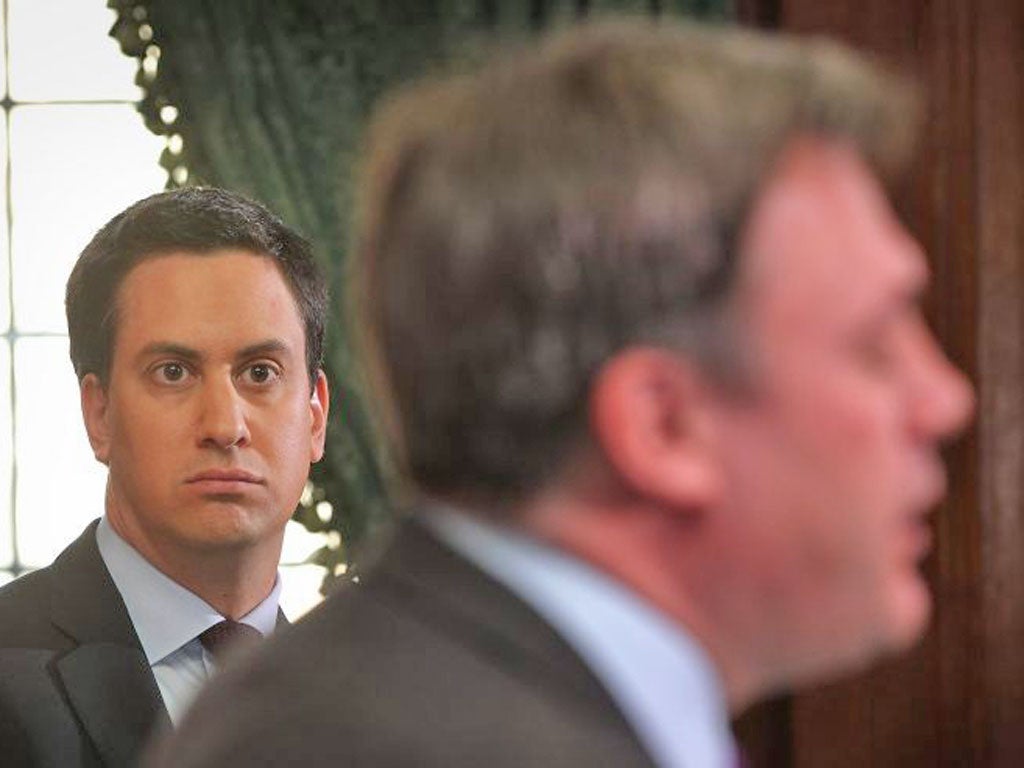It's Blair-Brown Mk II: Shadow Cabinet frets over war of between Ed Miliband and Ed Balls
Balls' banking-sector policy and Miliband's media performances straining relationship

Your support helps us to tell the story
From reproductive rights to climate change to Big Tech, The Independent is on the ground when the story is developing. Whether it's investigating the financials of Elon Musk's pro-Trump PAC or producing our latest documentary, 'The A Word', which shines a light on the American women fighting for reproductive rights, we know how important it is to parse out the facts from the messaging.
At such a critical moment in US history, we need reporters on the ground. Your donation allows us to keep sending journalists to speak to both sides of the story.
The Independent is trusted by Americans across the entire political spectrum. And unlike many other quality news outlets, we choose not to lock Americans out of our reporting and analysis with paywalls. We believe quality journalism should be available to everyone, paid for by those who can afford it.
Your support makes all the difference.Relations between the Labour leader Ed Miliband and his shadow Chancellor Ed Balls have become increasingly strained in recent months, senior party figures have claimed, with the two men clashing over policy and presentation.
Mr Miliband is said to be frustrated by the reluctance of Mr Balls to take a harder line on Britain's banking sector and demands that he be consulted on all policy statements.
At the same time, allies of Mr Balls have expressed frustration at Mr Miliband's poor media performances and suggest that the party would be doing better still in the polls if he were not leader.
Shadow Cabinet members are said to be increasingly concerned that the two are beginning to replicate the type of dysfunctional relationship that existed between Tony Blair and Gordon Brown during their time in power. Among recent examples are:
* Mr Balls pre-empted a keynote announcement by Mr Miliband calling for a public inquiry into Britain's banking sector. Mr Miliband had been due to make the call in a newspaper interview but Mr Balls got in first – announcing the plan a day early on the radio. The move infuriated Miliband aides who felt an agreed media strategy had been sabotaged.
* Shadow Cabinet members say Mr Miliband is failing to stand up to Mr Balls at meetings. They describe the shadow Chancellor as domineering and say he now insists on approving all policies regardless of whether they have an economic impact.
* Mr Balls is said to have blocked moves by Mr Miliband to take a tougher line on bank regulation. Mr Miliband wanted to announce that Labour would legislate to force retail banks to hive off their investment arms – but this was vetoed by Mr Balls. Mr Miliband's aides played down the disagreement.
When Mr Miliband appointed Mr Balls following the resignation of Alan Johnson, many senior figures in the party were concerned that the relationship would be difficult. Both men worked together for Gordon Brown and Mr Balls was said to have found it hard to reconcile working for someone who used to be junior to him in the Treasury.
At the time Mr Miliband did not deny that there had been tension in the past but said he was confident that both men could avoid a repeat of the bitter rivalry between Mr Blair and Mr Brown which destabilised New Labour. "We have seen that movie before and had front-row seats," he said at the time. "We are determined that there will be no sequel. It was a formative experience for both of us. It is something we are absolutely determined to avoid and we will avoid."
What concerns senior Labour colleagues now is that the pressures of Opposition have tested that optimism. "There are certainly tensions," said one source. "And it's on both sides of the relationship. Part of it is genuine disagreements about policy which can be worked through. But because of their history that can spill over into something more personal."
An ally of Mr Balls said: "It's certainly not like it was when Alan Johnson was shadow Chancellor. Miliband sat around musing about what to do with economic policy and was the dominant one. Now it's the case that Ed Balls takes the lead. The reason we are in the position we are is because he had a clear view of where to take the party."
But another source claimed Mr Balls was given to "displays of Alpha-male posturing" and that "Ed is frankly a bit scared of him. He doesn't know what Balls will do next. He refuses to listen to him on economic policy and believes he has a veto on all policy".
Observers are concerned that tensions may be exacerbated as Labour moves towards drawing up manifesto commitments at the next election – a process currently being overseen by Jon Cruddas.
An earlier effort led by the shadow Work and Pensions Secretary Liam Byrne – which was due to report in the autumn – has been scrapped.
Subscribe to Independent Premium to bookmark this article
Want to bookmark your favourite articles and stories to read or reference later? Start your Independent Premium subscription today.
Join our commenting forum
Join thought-provoking conversations, follow other Independent readers and see their replies
Comments